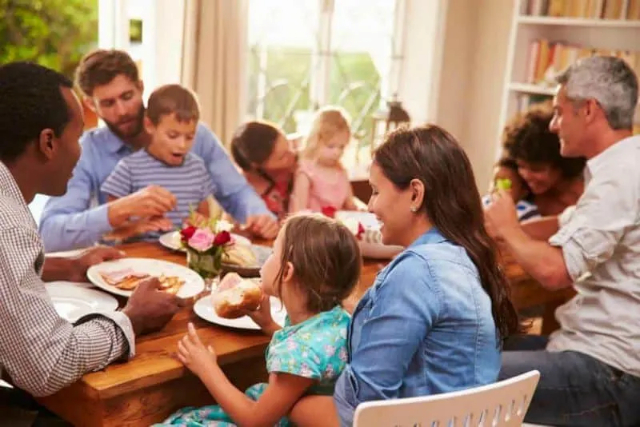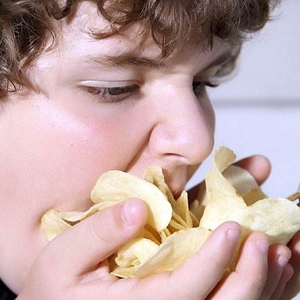Time for an update on research into childhood obesity. And there’s both good news and bad news. One thing our two reports today have in common is that they put the onus on parents to supervise their kids’ eating habits and take ownership of their kids’ obesity…
 Family Dinner: The ‘modern urban lifestyle’ has made this scene a historical relic…
Family Dinner: The ‘modern urban lifestyle’ has made this scene a historical relic…
Kids choices more driven by what they don’t like
We’ve all know that kids prefer foods they like – with stuff like candy and pop and burgers and fries at at the top of most of their lists. But a new study suggests that kids’ food choices are more strongly influences by what they don’t like.
Witness the experiment conducted by researchers at Penn State University, in which they fed kids a controlled meal and compared what they ate with what they said they liked – and disliked.
What they did
Children participated in two identical laboratory sessions in the study in which seven foods – chicken nuggets, ketchup, potato chips, grapes, broccoli, cherry tomatoes and cookies – were included on a tray. Also included were two beverages, fruit punch and milk.
Before eating the meals, children were asked to rate their liking of each food on a five-point scale – Super Bad, Bad, Maybe Good-Maybe Bad, Good and Super Good. After the children had eaten as much of the meal as they wanted, the researchers weighed what they ate and compared the results with what the kids said they liked and disliked.
What they found
Only ‘liking’ for potato chips, grapes, cherry tomatoes and fruit punch was positively associated with the amount of those foods consumed. But no associations were found between liking and intake of other meal items. However, there was a strong correlation between non-consumption and the foods the children said they didn’t like. actively and vehemently avoided the foods they sai they didn’t like.
Parents and elders play a key role
“[Kids] pick up on what is said around the table about what foods are good… [T]hey are taking it all in, and that’s affecting their perceptions of foods,” lead researcher Dr. Kathleen Keller said. “Milk is a good example of that – for some families, there may be a health halo effect around milk. Kids learn from an early age that drinking milk will give them a strong body, so they may drink milk even if it’s not their favorite beverage.”
The takeaway
Even at a young age, children’s food choices are influenced by their parents and peers, Keller pointed out. So, we need to be careful with assumptions about what truly is driving their behavior when they sit down to eat a meal.
Positive parenting can help kids avoid obesity
“A lot of the discussion around childhood obesity and other health risks focuses on identifying and studying the exposure to risk,” said Dr. Brandi Rollins, assistant research professor of bio-behavioral health at Penn State University. “We found that a supportive family and environment early in a child’s life may outweigh some of the cumulative risk factors that children can face.”
What they did
Rollins and associate Dr. Lori Francis analyzed data from over 1,000 mother-child pairs and found that children’s early exposures to family psychosocial assets – including a quality home environment, emotional warmth from the mother, and a child’s ability to self-regulate – had a direct effect on the development of obesity in the children.
What they found
“Research on parenting has shown that these types of family assets influence children’s behavior, academic success, career, and – not surprisingly – health,” Rollins said. “It is significant that these factors also protect against childhood obesity because the family assets we studied are not food or diet-specific at all. It is heartening to know that, by providing a loving, safe environment, we can reduce the risk that children will develop obesity.”
The takeaway
This study focused on childhood obesity, but the researchers said that parents may improve many outcomes for their children by learning responsive-parenting skills. Knowledge of responsive-parenting skills, however, may not lead directly to implementing those skills in the home.
No one can read a pamphlet about cars and suddenly expect to drive,” Rollins noted. “Driving is a skill that requires education and practice. The same is true of responsive parenting.”
My take
Here I go again, off on one of my trades about parents being in closer touch with their kids. In this day and age, when both parents in most households work and kids are shuffled around between before and after-school caregivers, pre-school programs, extracurricular activities, non-school sports, dance, music and other activities – limiting their time at meals with parents siblings and peers – it seems extremely unlikely that they’re getting all the positive attention the Penn State researchers would like them to be getting.
~ Maggie J.

